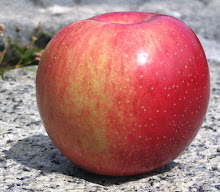
|
These globular apples run to medium-large with a red blush, patchy in places, covering green. There is a little ribbing, and my sample has a few bruises and a spot of the eminently ignorable flyspeck.
The flesh is a creamy white with yellow-green highlights, and at this point in the season (note: mid-November) is tender-crisp and juicy. No acidity to speak of.
The flavors are balanced with sweetness predominating, and there are hints of berries and a whiff of spices in the general cidery taste, a distinctive touch.
Such crosses do not automatically produce an average between parent A and parent B. Yet if you can imagine the flavors of McIntosh mellowed by those of Gold Delicious, or the even taste of a Golden Delicious enlivened with some of the sprightly qualities of a Mac, you would not be far off the mark for Brock.
This cross is also interesting because it represents the joining of two great
lines.
Both parents are each in turn the parent of a large family
of apple varieties, reflecting the extent to which breeders prize their good
qualities.


Adam, in your opinion how "macintoshy" is this Apple? I have tasted it and have some grafts growing but I wanted your opinion.
ReplyDeleteHawk, this is hard for me to answer in April! (And "macintoshy" is a pretty broad metric.)
ReplyDeleteBut based on my notes and best recollection, I would say it has some Macintosh flavors and qualities. I don't remember much vinousness, but it is clearly part of the tribe.
There are other varieties that are more Mac-like. (Hampshire comes to mind, but of course there are many other members of McIntosh's huge family.)
Brock has qualities of its own. It is less tart and a better keeper than the Mac. Presumably some of these interest you, or you would just have planted McIntosh.
What is your assessment, and what were your thoughts when you decided to grow this apple?
Brock is a promising Macintosh variety, with other flavor subtleties that can offer the die hard MAC lovers a Hawk Farm organic option, without tying up my acreage with apples that do not keep.
ReplyDeleteMost market farmers, or organic apple growers DO NOT have the advantage of having many acres of trees which can be U-picked in just a few weekends when customer Interest is high. Nor can we sell hundreds of bushels at a time to wholesalers at a fair price to justify the planting of large MAC acreages.
Also, Brock is a Maine Heritage Apple. These apples were planted as seedlings long ago, and those that remain are proven hardy, long lived, and have qualities that can be advantageous to orchards of today. Brock is a product of russ Bailey, in 1933 in monmoth,me from the university of Me program. It was named for Henry Brock, the orchards who first popularized it.
ReplyDeleteThere are many other native Maine varieties, many of which we are planting this year, and others will be fruiting for sale in 2013 at MOFGA events and our other retail venues/farmers markets. Here is a link for you and others about these awesome varieties.
http://www.mofga.org/Default.aspx?tabid=540
Thanks to Hawk Farm. Those of us who eat what others grow can learn a lot by looking at our food from the farmer's point of view.
ReplyDeleteI did not know that the Maine Organic Farmers and Gardeners Association curated an heirloom orchard. It's certainly a fitting project for a state that gave birth to so many wonderful apple varieties.
Yes it is, unfortunately most eclectic Apple growers may only have black oxford, or dudley winter if any of these awesome varities available for the good public. Kudos to the farm that provided your Brock, its a wonderful Apple.
ReplyDeleteI will have many of these varieties finally available in the next coming seasons, as well as other heirlooms you have yet to try.
Some of the early fall apples will be only be exclusively available at the common ground fair in unity,Maine. Apples such as Canadian strawberry can rival even cox Orange, but only last for approximately one month. These are worth planting in small quantities because they taste so amazing.